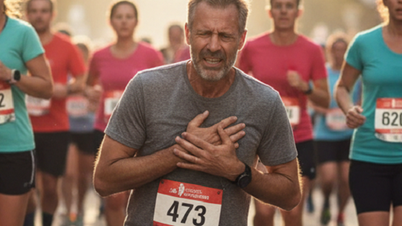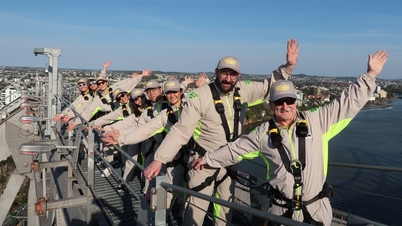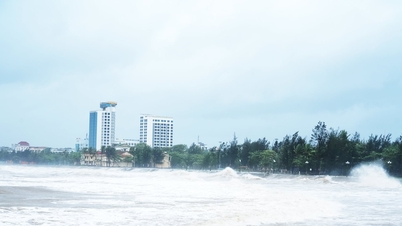
Exercising early in the morning can still have unpredictable harmful effects - Photo: CN
The risks of exercising early in the morning
However, from the perspective of sports science and exercise medicine, exercising early in the morning also has some potential risks. Especially when the practitioner does not understand the body's physiology, is not well prepared or chooses the wrong exercise intensity.
One of the important biological factors that few people know is that early morning - especially from 4am to 6am - is when body temperature is at its lowest of the day.
This means that muscle groups, tendons and ligaments are in a less flexible state, blood circulation is slower and the risk of injury increases if not warmed up properly.
According to a study published in the journal Chronobiology International , muscle strength and coordination may be 10-15% lower in the morning than in the afternoon. This reduces exercise performance and increases the risk of incorrect movements.
In addition, early morning is also the period when heart rate and blood pressure increase rapidly after a night's rest - a phenomenon called "morning surge".
Dr. Martha Gulati, a cardiovascular specialist at the University of Arizona (USA), warned: "In people at risk of cardiovascular disease, exerting yourself early in the morning, especially when you are not fully awake or have not had breakfast, can put sudden pressure on the circulatory system, causing heart rhythm disturbances, and even triggering angina attacks."
According to statistics from the American Heart Association, the rate of acute cardiovascular events such as myocardial infarction, stroke... tends to be higher between 6am and 9am.
Not only that, the central nervous system and neurotransmitters such as dopamine and serotonin need time to fully activate after waking up.
This causes a decrease in reflexes, spatial orientation, and muscle control in the first 30-60 minutes after waking up.
For people who practice high-tech movements like squats, deadlifts, fast cardio, or machines that require coordination, this is a risk factor for falls, dislocations, or muscle strains.
Another common risk is exercising when the body does not have enough energy. Many people exercise early in the morning while fasting or after not having enough sleep, especially those on strict diets.
This causes a deficiency in glycogen - the main energy source for muscles - which can easily lead to mild hypoglycemia, dizziness, loss of concentration and prolonged fatigue after exercise.
For women, if this condition persists, it can also affect hormones, leading to menstrual disorders or decreased metabolism.
Early morning outdoor exercise in cold or humid weather—typical in the cold season—can also cause peripheral vasoconstriction, increasing the burden on the heart and lungs.
People with a history of asthma, allergic rhinitis or chronic respiratory diseases are prone to airway constriction, causing difficulty breathing and early fatigue during exercise.
Should I exercise early in the morning?
So should you exercise in the morning? The answer is still yes. In fact, many benefits have been recorded when exercising in the morning such as improving mood, regulating circadian rhythms, and improving insulin sensitivity.
Morning is also a suitable time to exercise considering factors such as time, work, deserted roads...

Exercising early in the morning will bring many benefits if done correctly - Photo: CN
To minimize risks, practitioners need to pay attention to some basic scientific principles. First of all, you should wake up at least 30-45 minutes before starting to exercise so that your body has time to adapt.
Warm up thoroughly for 10-15 minutes with gentle movements such as walking, joint rotation, static stretching - to increase muscle temperature and blood circulation.
For workouts lasting longer than 30 minutes, it is recommended to have a pre-workout snack such as a banana, wholemeal bread or a few sips of milk to stabilize blood sugar. People with underlying conditions such as high blood pressure, heart disease or arrhythmia should consult a doctor before exercising early in the morning.
In addition, choosing the time to exercise should also be flexible according to personal circumstances. For those who sleep less than 6 hours a night, are often tired in the morning or show signs of overload, exercising in the evening - when the body has the highest performance of the day, will be a more optimal choice.
Morning exercise is a positive habit, but only if the practitioner understands his or her own biological rhythm and physiology. Forcing the body to exercise when it is not ready, lacking energy or sleep can turn exercise from a tonic into a silent harmful factor.
Source: https://tuoitre.vn/rui-ro-lon-khi-tap-the-duc-luc-sang-som-20250725191814792.htm


![[Photo] Prime Minister Pham Minh Chinh chairs the Government's online conference with localities](https://vphoto.vietnam.vn/thumb/1200x675/vietnam/resource/IMAGE/2025/10/5/264793cfb4404c63a701d235ff43e1bd)


![[Photo] Prime Minister Pham Minh Chinh launched a peak emulation campaign to achieve achievements in celebration of the 14th National Party Congress](https://vphoto.vietnam.vn/thumb/1200x675/vietnam/resource/IMAGE/2025/10/5/8869ec5cdbc740f58fbf2ae73f065076)




















































![[VIDEO] Summary of Petrovietnam's 50th Anniversary Ceremony](https://vphoto.vietnam.vn/thumb/402x226/vietnam/resource/IMAGE/2025/10/4/abe133bdb8114793a16d4fe3e5bd0f12)

![[VIDEO] GENERAL SECRETARY TO LAM AWARDS PETROVIETNAM 8 GOLDEN WORDS: "PIONEER - EXCELLENT - SUSTAINABLE - GLOBAL"](https://vphoto.vietnam.vn/thumb/402x226/vietnam/resource/IMAGE/2025/7/23/c2fdb48863e846cfa9fb8e6ea9cf44e7)





































Comment (0)